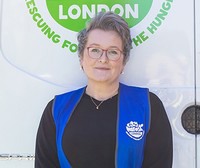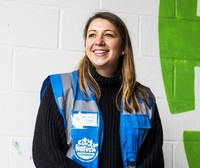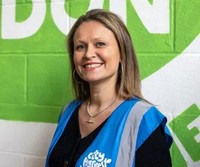Food waste is a major issue for produce companies as there is no market for 2nd class produce, and it costs money to dispose of surplus produce. This perfectly good food is often ‘just not quite good enough’ for retailers or ‘just a few fruits’ in a box that are not good - so the whole box has to be thrown out.
Getting rid of this produce can be time-consuming as well as costly, but there are many people, more so now with the cost-of-living crisis who are struggling and could really use this food.
London food charity City Harvest runs an efficient operation offering solutions to this very problem. City Harvest’s 60+ staff and 500+ volunteers are committed to preventing food waste and addressing food poverty. Funded by donations, grants, and corporate partnerships, they deliver free food for 1.2 million meals a month across every borough of London, delivering to 375+ charities and organizations such as schools, community centers, refuges, food banks, family centers, and homeless shelters.
 “The cost-of-living crisis has had a big impact on the demand for our services, staff, and people’s ‘new normal.’ ” Sarah Calcutt, CEO at City Harvest.
“The cost-of-living crisis has had a big impact on the demand for our services, staff, and people’s ‘new normal.’ ” Sarah Calcutt, CEO at City Harvest.
Sarah comes from a farming background and knows that there is nothing worse than seeing the efforts of all your hard work going into a hole in the ground. “By donating waste produce, City Harvest saves companies money from having it taken to AD. We can collect and give perfectly good food a new purpose. Margins are so small in fresh produce that if a pallet of veg fails QC, it can have a big impact. City Harvest has a very efficient network which can pick up goods and redistribute it on the same day.”
Since Jan 2023:
- Volume of fruit/veg collected in tonnes: 851 tonnes (44% of total food collected)
- Ave number of meals per month: 1,089,969 meals per month
- Ave value of meals per month: £2,179,939 per month
- Total number of meals donated since we started in 2014: 45,663,059 meals since inception.

Companies these days are conscious of their carbon footprint, City Harvest can give data back to them to show the environmental and social impacts of their food donation, and it can be used off-set carbon footprint.
Donations of surplus fresh produce come from many sources, including DCs, individual growers, and London’s two wholesale markets, New Spitalfields and New Covent Garden
“We are always looking for more donations, even if it is just a couple of boxes. It can go a big way and make many meals,” comments Sarah. “Big donations can also be taken. These we share or trade with other organizations, nothing goes to waste.”
 Mary Parsons has recently started at City Harvest, having been Head of Food at a company producing ready meals. She knows a lot about supply chain relationships and has already made her mark on the City Harvest team.
Mary Parsons has recently started at City Harvest, having been Head of Food at a company producing ready meals. She knows a lot about supply chain relationships and has already made her mark on the City Harvest team.
“People and businesses can’t get away from food waste. We want to make it easier for people to use this waste and not just have it go to landfill. It really is as simple as sending us an email or giving us a call, and we will do our best to pick it up. Sometimes in larger companies, it’s the people at the top who don’t realize just how much is being wasted as it’s often just a figure on a spreadsheet, but it’s the people in the warehouse and on production floors who see it daily. We desperately want to help them move this food and see it put to good use instead.”
 Fiona Hollis, Head of Communications: “We saw a big change during lockdown when people started to bring produce to us instead of us always having to ask for donations. It is no longer a case that charities like us have to go cap in hand to people, we actually deliver a service that saves them money and benefits the company. It is a very easy solution to food waste.”
Fiona Hollis, Head of Communications: “We saw a big change during lockdown when people started to bring produce to us instead of us always having to ask for donations. It is no longer a case that charities like us have to go cap in hand to people, we actually deliver a service that saves them money and benefits the company. It is a very easy solution to food waste.”
For more information:
Mary Parsons
City Harvest London
Tel: +44 (0) 207 041 8491
[email protected]
cityharvest.org.uk
